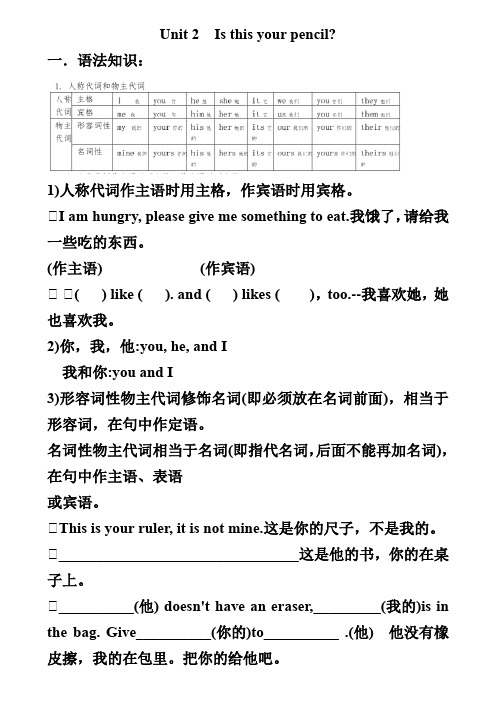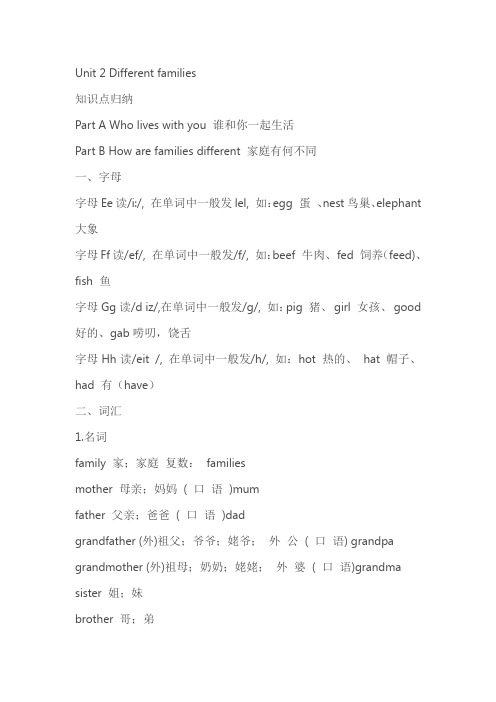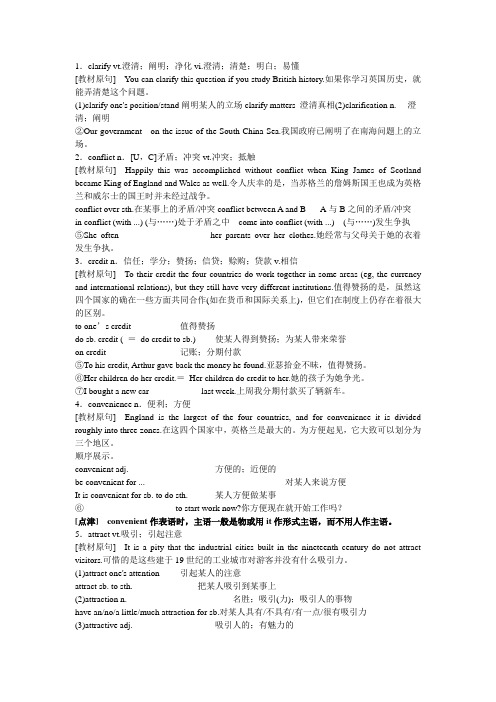Unit2知识点归纳
Unit 2 知识点提要

8A Unit 2 知识点提要一、词汇1.广告可n. advertisement ▲(an/-s)2.英国的adj. British3.美国的adj. American4.饼干可n. <英> biscuit (a/-s)、<美> cookie (a/-s)5.卡车可n. <英>*lorry ▲(a/lorries)、<美> truck (a/-s)6.橡皮可n. <英> rubber (a/-s)、<美>eraser ▲(an/-s)7.足球可n. <英> football (a/-s)、<美> *soccer (a/-s)8.假期可n. <英> holiday (a/-s)、<美> vacation (a/-s)9.秋天可n. <英> autumn (a/-s)、<美> fall (a/-s)下落;跌倒;倒塌↓v. fall→三单:-s →▲过去式:fell →▲现分:-ing10.商店可n. <英> shop (a/-s)、<美> store (a/-s)11.院子可n. <英> garden (a/-s)、<美> y ard (a/-s)12.电影可n. <英> film (a/-s)、<美> movie (a/-s)[典型例题]( ) 1. People in the UK say biscuit while people in the USA say ______.A. cakeB.cookieC.eraserD.soccer( ) 2. Which sentence is likely (可能) to be spoken by Americans?A. David Beckham is a popular soccer star.B. The shop sells different kinds of biscuits.C. It doesn’t rain often in this city in autumn.D. The film is very popular.( ) 3. If you are an Englishman, you may say “__________ ”A.I want some cookies.B. Autumn is coming.C. Can I borrow your eraser?D. He often plays soccer with his friends.13.男女混合的,混合的adj. *mixed★一所混合学校a mixed school混合v.8AU4mix →▲三单:-es →过去式:-ed →现分:-ing把A与B混合mix A with B把...混合在一起8AU4mix ... together14.法语不可n. &法国人可n.(a/-s) &法国(人)的adj.8BU4French法国可n. France (a/-s) 常用单数15.外国的adj. foreign (not in or from your own country)外国人可n. foreigner (a/-s)16.语言可n. language (a/-s) (words used in speaking and writing)区分:青少年可n. *teenager (a/-s)17.在…期间prep. during18.讨论,议论v. discuss (talk about something)→▲三单:-es →过去式:-ed →现分:-ing★与某人讨论某事discuss sth. with sb.讨论可n.8BU5 discussion (a/-s)19.在课堂上(短语)in class20.<口>家伙可n. *guy (a/-s)21.<口>好朋友;搭档可n.*buddy ▲(a/buddies)22.主动提出,自愿给予v. offer (give something to someone)→三单:-s →过去式:-ed →现分:-ing★为某人提供某物(2种)offer sth. to sb.= offer sb. sth.★给某人某物(2种)give sth. to sb.= give sb. sth.23.结束v. end →三单:-s →过去式:-ed →现分:-ing终止;末尾;终点可n.7BU8end (a/-s)24.棒球可n. baseball (a/-s)25.赢得;赢,获胜v. win (be best or first in a competition)→三单:-s →▲过去式:won →▲现分:winning获胜者可n. winner (a/-s)26.最少的;最小的adj. (little的最高级) least27.至少,不少于(短语)at least28.至多,不超过(短语)at most29.较远(的)/更远(的) adj.&adv. (far的比较级) farther/further★further常考固搭(5种)进一步学习/研究further study/ research 进一步讨论further discussion更多的信息further information 其他的问题further questions再往前/下走8BU3further on/ down30.最远(的) adj.&adv. (far的最高级) farthest/furthest31.花费(时间或金钱) v. spend →三单:-s →▲过去式:spent →现分:-ing★★★★★“花费”公式(4种)It/事takes/took sb. 时间段to do sth.人spend(s)/spent时间段/金钱on sth.(in) doing sth.人pay(s)/paid(金钱)for sth.物cost(s)/cost sb. 金钱(A.takes; spendsB. takes; costsC. costs; costsD. spends; takes( )2. [基础题]The trip to the zoo _______ us about one hour by underground yesterday.A. paidB. tookC. spentD. cost( )3. [易错题]This dress is too expensive, it ____ me 2000 yuan.A.takesB. spendsC. paysD. costs( )4. [难题]He tries to spend as much time as he can ____ computer games.A. playB. playsC. playingD.to play32.制服可n. *uniform ★(a/-s)穿校服wear a school uniform= wear school uniforms33.国际象棋不可n. chess34.每日的,日常的adj.&日报n. daily35.每周的adj. weekly36.快的adj. quick 比较级:-er 最高级:the -est快地adv. quickly比较级:more ~ 最高级:the most ~慢的adj. slow 比较级:-er 最高级:the -est慢地adv. slowly比较级:more ~ 最高级:the most ~37.自始至终,从头到尾&(内部)穿过7BU6 prep. th r ough区分:though/although prep. 尽管thought v. 认为(think的过去式)38.浏览,快速查看(短语)look through39.真实的,真的adj. real真实地;确实,的确adv. really40.起初,首先(短语)at first41.继续/重复做某事(短语)keep (on) doing sth.[拓展] “继续做某事”(4种)keep (on) doing sth.= continue doing sth.= carry on doing sth. = carry on with sth.42.完成;结束v. finish →▲三单:-es →过去式:-ed →现分:-ing★完成做某事finish doing sth.43.午餐时间不可n. lunchtime★在午餐时间at lunchtime44.物理(学) 不可n. physicsPhysics _______ (be) a useful subject, the student must learn it wisely and well.45.羽毛球运动不可n. *badminton[总结] ★★★常考冠词题play+球类、棋、牌、中国乐器 e.g. play baseball/badminton/chess/cards/erhu(二胡) play the+西洋乐器 e.g. play the piano/violin/guitar/drums(鼓)46.理想的adj. *ideal★一所理想的学校an ideal school区分:想法,主意,思想可n. idea▲(an/-s)二、语言点1.(某人)为什么不做某事Why don’t/doesn’t/didn’t sb do sth. =why not do sth.2.like作动词意为“喜欢”,作介词意为“像”(无时态、人称、数的变化)be like 像;look like 看起来像像做某事be like doing sth.—What is your school life like?—It is like _______ (live) in a big garden.( ). Tom, _____ his brother, _____ playing basketball after school.A.like; likesB. like; likeC. likes; likesD. likes; like3.little “几乎没有”,修饰不可n. a little “有一些”,修饰不可n.few “几乎没有”,修饰可n.复 a few“有一些”,修饰可n.复4.你想要做某事吗?Would you like to do sth. ?肯定回答:Yes, I’d like/love to. 否定回答:I’d like/love to, but……5.做某事玩得开心have a good/great/nice/lovely/wonderful/fantastic time doing sth.有很多much/lots of/a lot of没有have no有更多时间做某事more time to do sth.有更少less有一段some time[典型例题]( )1. —Hey, guys. Do you often have a good time _____ after-school activities?—Of course, we do. And we always have a lot of time_____ soccer.A. to do; to practiseB. doing; to practiseC. to do; practisingD. doing; practising( )2.Amy had a lovely time ____ one place after another in Shanghai and she had much time _____ the city.A. to visit; to enjoyB. visiting; to enjoyC. to visit; enjoyingD. visiting; enjoying( )3.Linda had a great time ____ with her friends, and they also had some time ____ about their studies last weekend.A.to talk; to talkB. to talk; talkingC. talking; to talkD. talking; talking6.练习做某事practice doing sth.( )1. My brother enjoys __________ the piano in the music room.A.practice playingB. practice playC. practicing playingD. practice to play( )2. The two girls always have a good time ________ the piano together.A.practice to play B.to practice to play C.to practice playing D.practicing playing( )3. [难题]We should spend as much time as we can __________ English every day.A. practice speakingB. practice to speakC. on practicing speakingD. practicing speaking7.给某人买某物buy sth. for sb.= buy sb. sth.8.在几年级(2种)in Year/Grade+基数词= in the+序数词+year/gradee.g. 在八年级______________________= ______________________(思考:如果改用阿拉伯数字呢?)9.单个动名词作主语,谓语动词用单数As we all know, using public chopsticks ________ (be) necessary when we eat with others.10.“借”(3种)borrow/borrowed 借入borrow sth. from sb.从某人那借来某物lend/lent 借出lend sth. to sb.= lend sb. sth.把某物借给某人keep/kept 借用keep sth. for+时间段借用某物一段时间How long提问①(for)+时间段①since +时间点①since 从句How soon提问in +时间段How far提问路程①实际距离 e.g.500 metres①s’ walk/ ride /drive /flight(航行) /bus ride /car ride/ train ride①时间段+交通方式e.g. 15 minutes by bus How often提问频率①次数+a+时间单位 e.g. twice a week①every+时间单位 e.g. every day③频度副词7个:always总是、usually通常、often经常、sometimes有时、seldom很少、hardly几乎不、never从不( )1—How far is it from your home to your school? —________.A.On foot B.I can take a bus there C.It’s about half an hour D.About ten minutes’ walk( )2.— How long have you had the bike? — ______ two years. A.in B.until C.since D.for ( )3.— How soon will these waste bottles be recycled?—_________. I have called the recycling company. A.For an hour B.An hour ago C.After an hour D.In an hour( )4.—_________ do you go to the concert? — Always, because I’m interested in it.A.How longB. How soonC. How oftenD. How far( )5. —________ is it from here to your home town? — Well, it takes over three hours to get there by coach. A. How soon B. How much C. How long D. How far( )6.—________do you have after-school activities? —Twice a week.A.How long B.How far C.How often D.How soon( )7. [易错题]—________ do you hear from your parents a week? —At least twice a week.A. How many timesB. How soonC. How oftenD. How long12.一篇由一个美国男孩写的文章an article (written) by a boy from the USA13.the number of…“…的数量”作主语,谓V.用单数;a number of…“许多”作主语,谓V.用复数( ). —A number of volunteers ________ willing to teach in China’s rural areas(农村地区).—Yes, the number of them _______ getting ________.A. is; are; more and moreB. are; is; larger and largerC. is; is; bigger and biggerD. is; are; more and more14.提问数量的句型(2种)What’s the number of the students in your class?=How many students are there in your class?15.seem“似乎”用法(3种)①seem (to be)+adj. ②seem to do sth. ③It seems that+从句16.[难点]need作动词的2种用法若need是情态动词,need do sth. ; 若need是实义动词,need to do sth.解题关键:如何判断need是情态动词还是实义动词?法一:看三单__________________ 法二:看否定__________________ 法三:看提问__________________ ( )1. Millie ______ her homework at the moment.A. needs not finishB. doesn’t need finishC. need not to finishD. doesn’t need to finish( )2. You needn’t ______ those things if you ______ them.A.buy; needn’tB.to buy; don’t needC.buy; don’t needD.to buy; needn’t( )3. —Does he need ______ there at once ? —No, he ______ leave so hurriedly because he has enough time.A. to go; needB. go; needn’tC. to go; needn’tD.go; doesn’t need17.代词it/one(s)的区分:it同类且同物、one(s)同类不同物( ). —The black dress doesn’t look nice on me. I don’t like _____ at all. —How about the blue _____?A.one; one B.it; one C.it; it D.one; it18.Each of(√);every of(×)19.Each of us ________(have) a book. We each ________(have) a book.20.有一个星期的假期have a week off21.★对每科进行一次月考have a monthly test on each subject22.我的日常生活my daily life23.有很多时间参加课外活动have lots of time for after-school activities24.★有一小时的家庭作业have an hour of homework25.★进行一次学校旅行(2种)go on/for a school trip26.★停止做某事(同一件事)stop doing sth. 停下来去做某事(另一件事)stop to do sth. ( )1. We have worked so long. Let’s stop ______ a rest.A.have B.to having C.having D.to have( )2.My father told me a funny joke and I can’t stop ________ every time I think of it.A.to laugh B.laughing C.from laughing D.Laughmore+可n.复/不可n.+than 比…多less+不可n.+than 比…少fewer+可n.复+than 比…少the most+可n.复/不可n.最多the least+不可n.最少the fewest+可n.复最少。
英语九年级全一册Unit2知识点

英语九年级全一册Unit2知识点Unit2是英语九年级全一册系列中的一个单元,着重讲解了一些重要的语法知识和词汇。
在本文中,我们将就该单元的一些重要知识点进行详细介绍。
一、动词的过去分词形式在Unit2的学习中,我们需要掌握动词的过去分词形式,因为它们在完成时态、被动语态等语法结构中起到关键作用。
动词的过去分词形式通常是加上ed、d或了的。
例如:1. play——played(玩——玩过)2. watch——watched(看——看过)3. do——done(做——做过)值得注意的是,也有些动词的过去分词形式要变化,需要特别记忆。
例如:1. go——gone(去——去过)2. eat——eaten(吃——吃过)二、目的状语从句Unit2中还介绍了目的状语从句的用法。
目的状语从句用来表示目的或意图,通常由连接词"so that"或"in order that"引导。
例如:1. He studies hard so that he can get good grades.(他努力学习,以便能取得好成绩。
)2. They saved money in order that they could go on a trip.(他们存钱以便能去旅行。
)目的状语从句在句子中起到修饰作用,使句子意思更加明确。
三、情态动词Unit2还介绍了一些情态动词的用法,如can、could、may、might、shall、should、will、would等。
情态动词在句子中表示说话人的意愿、推测、建议、允诺等情态。
例如:1. You should study hard for the exam.(你应该为考试努力学习。
)2. They may go to the park tomorrow.(他们可能明天去公园。
)情态动词在句子中的具体用法需要根据具体语境来理解和掌握。
四、描写性形容词和描写性副词在Unit2的学习中,我们还需要掌握描写性形容词和描写性副词的用法。
Unit 2单元复习知识点 人教新目标英语七年级上册

Unit 2 Is this your pencil?一.语法知识:1)人称代词作主语时用主格,作宾语时用宾格。
①I am hungry, please give me something to eat.我饿了,请给我一些吃的东西。
(作主语) (作宾语)① ①( ) like ( ). and ( ) likes ( ),too.--我喜欢她,她也喜欢我。
2)你,我,他:you, he, and I我和你:you and I3)形容词性物主代词修饰名词(即必须放在名词前面),相当于形容词,在句中作定语。
名词性物主代词相当于名词(即指代名词,后面不能再加名词),在句中作主语、表语或宾语。
①This is your ruler, it is not mine.这是你的尺子,不是我的。
①________________________________这是他的书,你的在桌子上。
①__________(他) doesn't have an eraser,_________(我的)is in the bag. Give__________(你的)to__________ .(他) 他没有橡皮擦,我的在包里。
把你的给他吧。
2.Is this/that..,?这/那是...... 吗?Yes, it is. / No, it isn’t.是的,这/那(它)是。
/不,这/那(它)不是。
①回答时,要用it来代替this和that。
Is this/that your ruler? Yes, it is. /No, it isn’t.不可回答Yes, this/that is, / No, this/that isn't.3. Excuse me.请原谅/打扰了(客套语,用于问别人问题、请别人帮忙、打断别人说话等场合。
)Sorry/I’m sorry.“对不起,抱歉”(用于向别人表示歉意)A: Excuse me. Where is my pen?打扰了,我的钢笔在那?B: Sorry/I'm sorry. I don’t know.对不起,我不知道。
Unit 2 Different families 知识点归纳+练习(含答案)

Unit 2 Different families知识点归纳Part A Who lives with you 谁和你一起生活Part B How are families different 家庭有何不同一、字母字母Ee读/i:/, 在单词中一般发lel, 如:egg 蛋、nest鸟巢、elephant 大象字母Ff读/ef/, 在单词中一般发/f/, 如:beef 牛肉、fed 饲养(feed)、fish 鱼字母Gg读/d iz/,在单词中一般发/g/, 如:pig 猪、girl 女孩、good 好的、gab唠叨,饶舌字母Hh读/eit /, 在单词中一般发/h/, 如:hot 热的、hat 帽子、had 有(have)二、词汇1.名词family 家;家庭复数:familiesmother 母亲;妈妈( 口语)mumfather 父亲;爸爸( 口语)dadgrandfather (外)祖父;爷爷;姥爷;外公( 口语) grandpa grandmother (外)祖母;奶奶;姥姥;外婆( 口语)grandma sister 姐;妹brother 哥;弟uncle 舅父;叔父;伯父;姑父;姨父aunt 姑母;姨母;伯母;婶母;舅母cousin 堂(表)兄弟;堂(表)姐妹baby 婴儿2.动词have 有I have two cousins too. 我还(也)有两个堂姐。
3.形容词big 大的You have a big family. 你有一个大家庭。
small 小的My family is small. 我的家庭很小。
4.代词me 我They can play with me. 他们可以和我一起玩。
5.限定词some 一些Some families are small. 有些家庭是小的。
三、句型1.介绍身边的人/事物This is+人/事物-This is my friend,Sarah Miller. 这是我的朋友萨拉·米勒。
unit 2知识点

1.clarify vt.澄清;阐明;净化vi.澄清;清楚;明白;易懂[教材原句]You can clarify this question if you study British history.如果你学习英国历史,就能弄清楚这个问题。
(1)clarify one's position/stand阐明某人的立场clarify matters 澄清真相(2)clarification n. 澄清;阐明②Our government on the issue of the South China Sea.我国政府已阐明了在南海问题上的立场。
2.conflict n.[U,C]矛盾;冲突vt.冲突;抵触[教材原句]Happily this was accomplished without conflict when King James of Scotland became King of England and Wales as well.令人庆幸的是,当苏格兰的詹姆斯国王也成为英格兰和威尔士的国王时并未经过战争。
conflict over sth.在某事上的矛盾/冲突conflict between A and B A与B之间的矛盾/冲突in conflict (with ...) (与……)处于矛盾之中come into conflict (with ...) (与……)发生争执⑤She often her parents over her clothes.她经常与父母关于她的衣着发生争执。
3.credit n.信任;学分;赞扬;信贷;赊购;贷款v.相信[教材原句]To their credit the four countries do work together in some areas (eg, the currency and international relations), but they still have very different institutions.值得赞扬的是,虽然这四个国家的确在一些方面共同合作(如在货币和国际关系上),但它们在制度上仍存在着很大的区别。
七年级上册英语Unit 2知识点梳理

七年级上册英语Unit 2知识点梳理七年级上册英语Unit 2知识点梳理Unit 2 Is this your pencil ?一、 be 有三个形式:am is are 。
am 是be单第一人称单数形式; is 是be 的第三人称单数形式;are 是be的复数形式; be 是am is are 的原型。
be 的形式与主语的连用:am--------------- I (第一人称单数主语)heshe itthis tha单数名词is----------------- 不可数名词 (第三人称单数主语)动词不定式动名词we you theyare -------------- these those (复数主语)复数名词二、 Excuse me . 可以灵活翻译成“劳驾、打扰了”。
当要“与陌生人搭话”或者“将要做的事会打扰别人”时,使用该语言。
三、含be的肯定句变否定句和一般疑问句的方法以及一般疑问句的回答方法。
含be的肯定句变否定句be + not (is not isnt are not arent )变一般疑问句be提到主语前(am are I you my your)一般疑问句的简略回答用Yes或No回答。
借用一般疑问句的第一个词,且主语用主格人称代词。
练习题 (一)、把下列含be的肯定句先变成否定句,再变成一般疑问句,然后做一般疑问句。
肯定句否定句一般疑问句肯定回答否定回答1、肯定句 This is my pencil . (这是我的铅笔)否定句 This ______my pencil . (这不是我的铅笔)一般疑问句 ______ this______ pencil ? (这是你的铅笔吗)肯定回答 ____________. 否定回答. _____________2、肯定句 That is my eraser .(那是我的橡皮擦)否定句 That ______eraser . (那不是我的橡皮擦)一般疑问句 ______ that ______eraser ? (那是你的橡皮擦)肯定回答 ____________ 否定回答 ______________3、肯定句 These are my pens . (这些是我的钢笔)否定句 These______ my pens . (这些不是我的钢笔)一般疑问句 ______ these ______pens ? (这些是你的钢笔吗)肯定回答 ____________. 否定回答 ____________ .4、肯定句 Those are his baseballs . (那些是他的棒球)否定句 Those ______his baseballs . (那些不是他的棒球)一般疑问句 ______those ______ pens ? (那些是他的棒球吗)肯定回答 ____________ 否定回答 ____________5 、肯定句 I am Helen (我是海伦)否定句 ______ ______Helen . (我不是海伦)一般疑问句 ______ ______Helen . (你是海伦吗)肯定回答 ____________. 否定回答 ____________ .6 、肯定句 It is her notebook . (它是她的笔记本)否定句 It ______her notebook . (它不是她的笔记本)一般疑问句 ______ ______ her notebook ? (它是她的笔记本吗)肯定回答 ____________. 否定回答 ____________ .7、肯定句 A lot of keys are in the pencil—case .(许多钥匙在铅笔合里)否定句 A lot of keys ______in the pencil—case .(许多钥匙不在铅笔盒里)一般疑问句 ______a lot of keys in the pencil—case ? (许多钥匙在铅笔盒里吗?)肯定回答 ____________. 否定回答 ____________ .(二)、补全对话Jim: ______ ______ , Tom . Is this your dictionary ?Tom: Yes,______ ______Jim : Whats this ?Tom: Its _______ eraser .Jim : How do you ______ it ?Tom : E—R—A—S—E—R本快词汇:they他们 these这些 those 那些pencil 铅笔 isnt 不是 arent不是dictionary 词典 baseball棒球 noteball笔记本key钥匙ring 打电话 call 打电话ruler尺子 pen钢笔 pencil—case铅笔盒eraser橡皮擦 a lot of许多every day每天 Excuse me 劳驾打扰了。
七年级上册英语unit2知识点归纳

七年级上册英语unit2知识点归纳本文将为大家归纳整理七年级上册英语Unit 2的知识点,旨在帮助学生更好地掌握这一单元所学内容。
一、重点词汇1. wake up:醒来例如:I usually wake up at six o'clock in the morning.2. get up:起床例如:I get up after I wake up.3. have breakfast/lunch/dinner:吃早/午/晚饭例如:I usually have breakfast at seven o'clock in the morning.4. go to school:去上学例如:I usually go to school by bus.5. do homework:做作业例如:I always do my homework after school.6. watch TV:看电视例如:I like to watch TV in the evening.二、动词时态1. 一般现在时例如:I usually wake up at six o'clock in the morning.2. 现在进行时例如:I am doing my homework now.3. 一般过去时例如:I went to the park yesterday.4. 过去进行时例如:I was watching TV when my friend called me.三、日常生活用语1. 问候例如:How are you?2. 对话例如:A:What time do you usually wake up?B:I usually wake up at six o'clock in the morning.3. 请求例如:Can you help me with my homework?4. 命令例如:Clean your room, please.四、其他重要知识点1. 序数词例如:first,second,third,fourth,fifth,sixth,seventh,eighth,ninth,tenth2. 人称代词例如:I,you,he,she,it,we,they总之,七年级上册英语Unit 2的知识点主要包括了一些基础的英语词汇、动词时态和常用口语表达等方面,希望大家通过本文的学习,能够更加熟练地运用这些知识点,从而提高自己的英语水平。
Unit2高频词汇知识点清单高中英语人教版选择性

新教材人教版英语选择性必修第一册UNIT 2UNIT 2高频词汇知识点清单UNIT 2 LOOKING INTO THE FUTURE目录高频词汇精讲1. persuade vt. 劝说;说服;使相信2. switch vt. 转换;交换vi. & vt. (使)改变;转变n. 开关;转换器;改变3. preference n. 爱好;偏爱;偏爱的事物4. mand n. 指令;命令;控制;掌握vt. 命令;控制5. warning n. 警告;警示;先兆6. relevant adj. 有关的,切题的;有价值的,有意义的7. available adj. 可获得的;可购得的;可找到的;(人)有空的8. in this sense/in. . . sense从这种/某种意义上来讲9. bine v. (使)结合;混合;兼有;合并;同时做10. oppose vt. 反对;抵制;阻挠;竞争11. absence n. 不存在;缺乏;缺席12. potential adj. 可能的;潜在的n. 潜力;可能性13. resist vi. & vt. 抵制;反抗;抵挡高频词汇积累结构1. the instant一……就……结构2. it will take/will be+时间段+before. . . 要过多久才会……结构3. make+形式宾语it+宾语补足语+真正的宾语将来进行时一、将来进行时的构成与形式二、将来进行时的主要用法三、将来进行时与一般将来时的区别高频词汇精讲1. persuade vt. 劝说;说服;使相信For example,the phrase in my opinion tells us that the passage is likely meant to persuade.例如,“在我看来”这个短语告诉我们这篇文章很可能意在说服(读者)。
(教材P14) 情景导学He then persuaded me to try/into trying ice hockey.然后他说服我去打冰球。
- 1、下载文档前请自行甄别文档内容的完整性,平台不提供额外的编辑、内容补充、找答案等附加服务。
- 2、"仅部分预览"的文档,不可在线预览部分如存在完整性等问题,可反馈申请退款(可完整预览的文档不适用该条件!)。
- 3、如文档侵犯您的权益,请联系客服反馈,我们会尽快为您处理(人工客服工作时间:9:00-18:30)。
第二单元知识点总结归纳熟记以下短语1.给出个人反应give a personal reaction2. 泼水节the Water Festival3.龙舟节the Dragon Boat Festival4. 春节the Spring Festival5.灯笼the Lantern Festival6. 在泰国/香港/北京in Thailand/Hong Kong/Beijing7. 多么美好的一天! What a great day! 8. 一点a little/ a bit/ a little bit9. 看望亲戚/朋友/同学visit relatives/friends/classmates10. 出去吃饭eat out/ go out for dinner 11. 在六月in June12.在(某人的)假期on the /one’s vacation 13. 一天吃五餐eat five meals a day 14. 看着很有意思be fun to watch 15. 增加(体重)/发胖/穿上put on 16. 在两周以后in two weeks(将来时)after two weeks (过去时)after +点(将来时或过去时间)17.听起来像… sound like+n或句子18.一年最热的月份the hottest month of the year 19. 从…到… from …to…20.和…相似be similar to 21. …的时间the time of22.在街道上in /on the street 23. 把某物扔给某人throw sth to sb24.把某物向某人扔去throw sth at(带情感)25. 彼此互相each other 26.…..的时候a time for doing 27. 洗掉…wash away28.(有)好运(have)good luck 29. 满月a full moon30.品尝月饼enjoy mooncakes. 31. 好几个世纪for centuries 32.呈/以……的形状in the shape of 33. 把…带给…carry sth to sb34.传统的民间故事traditional folk stories 35. …的故事the story of… 36.最令人感动的the most touching 37. 射掉shoot down38.给某人某物give sb. sth./give sth. to sb.39.(为做某事)感谢某人thank sb.(for doing sth.)(通过做)感谢某人thank sb. by doing sth. 40. 计划做plan to do sth 41.设法做某事try to sth. 42. 不在家be not home43.拒绝做… refuse to do sth 44. 飘向… fly up to45.对…喊出call out one’s name to… 46. 摆开/布置lay out sth in /on /at 47. 回来come back/ be back/ get back 48. ……的传统the tradition of…49.赏月admire the moon 50. 结果as a result51.一个……另一个……one …the other…52.五月第二个星期the second Sunday of May53.六月第三个星期天the third Sunday of June54.母亲节/父亲节Mother’s Day/Father’s Day 55. 给…礼物give gifts to sb56. 带…出去吃饭take sb out for dinner/lunch57.越来越受欢迎more and more popular58. 展示/表达我们的爱show our love 59. 花很多的钱spend a lot of money 60. 帮助…做…help (to) do sth/help with sth 61. 打扮/装扮dress up 62. 装扮成....人dress up as sb 63. 不招待就使坏trick and treat64. 看上去吓人/可怕look scary65. 关上/打开/调高/调低turn off/on/up/down66. 把……放在…..周围put sth. around … 67. 寻求…… ask for…68. 开某人玩笑play a trick /a joke on ab. 69. 了解learn about 70. 在北美in North America 71. 给某人款待give sb. a treat 72. 考虑think of 73. …的真正意义the true meaning of…74. ……(….的)最好的例子the best example(of )75. 只想着自己only think about oneself 76. 对别人友好treat others nicely 77. 关心/关注care about 78. 挣(更多)钱make (more) money 79. 过去常常…used to do sth. 80. 受到惩罚be punished82. 因…而处罚某人punish sb. for… 83. 告诫…去做…warn sb. to do84. 提醒…要注意…warn sb. about sth. 85. 警告…(不要)做warn sb. (not) to do 86. 最终成为end up 87. 期待…做…expect sb. to do sth.88. 带回到…take back… 89. 把…带回到…take sb back to ...90. 使…想起… remind sb of sth/ sb 91. 提醒某人做… remind sb to do sth / remind sb. of sth.92. 醒来wake up 93. 查明/弄清情况find out94. 决定做… decide to do sth 95. 改变…的生活change one’s life 96. 承诺做… promise to do sth 97. 真需要in need98. …对待…treat sb with +adj 99. …的开端the beginning of 100. ...的重要性the importance of doing sth. 101. 产生新生命give birth to life 102. …的象征a symbol of 103. 不但…而且not only … but (also)104. 结果as a result 105. 圣诞节前夕Christmas Eve一、由that,if和whether以及疑问词引导的宾语从句宾语从句:在主从复合句中,做主句谓语动词宾语的句子就叫宾语从句。
三个考点:1. 引导词1)由陈述句充当宾语从句时,这个宾语从句由that引导,在口语中that可以省略。
I hear(that) she’s going to give you a call.2)由一般疑问句充当宾语从句时,该从句由if/whether引导。
3)由特殊疑问句充当宾语从句时,该从句由原来的疑问词引导。
2. 语序宾语从句要用陈述句语序。
3. 时态(1) 主现从不限。
即当主句谓语动词用一般现在时的时候,宾语从句可以根据需要用各种时态。
(2) 主过从四过。
即当主句谓语动词用一般过去时的时候,宾语从句要用过去的某种时态。
(包括一般过去时、过去进行时、过去将来时、过去完成时)(3)如果宾语从句所陈述的是客观真理、自然现象、格言、谚语、等时,则用一般现在时。
4温馨提示:if和whether引导的宾语从句时区别一般情况下可以互换,但有下面区别:(1)宾语从句至句首时用whether。
Whether it is true or not,I can’t say.(2)介词后用whether . It depends on whether you can do the work well.(3)与不定式连用时用whether。
He can’t decide whether to accept or refuse.(4)当与or not连用时用whether。
I don’t care whether or not he comes.二、what和how引导的感叹句1.感叹句句型结构(1)what引导的感叹句后接名词。
该名词前常有形容词修饰,句中的主语和谓语一般可省去。
句型结构为:what(+a/an)+形容词+名词(主语+谓语)!What a cold day(it is) today!What delicious food(it is)!What引导感叹句中的名词若为单数可数名词,要用不定冠词a/an,而不用the;若为复数或不可数名词,则不用冠词。
(2)how引导的感叹句后接形容词或副词。
其句型结构为:how+形容词/副词+主语+谓语!或how+形容词+a/an+单数可数名词+主语+谓语!How cold it is today!How happy the children are!2.陈述句改为感叹句常使用“一断二加三换位”的方法:(1)“一断”,即在谓语动词后边断开,把句子分成两部分She is~a beautiful girl. He works ~hard.(2)“二加”,即如果第二部分的最后一个词为形容词、副词,就加上how;如果是名词(词组),就加上what。
She is~(what)a beautiful girl. He works ~(how) hard.(3)“三换位”,即把第一部分与第二部分互换位置,同时把句号换为感叹句。
What a beautiful girl she is! How hard he works!。
